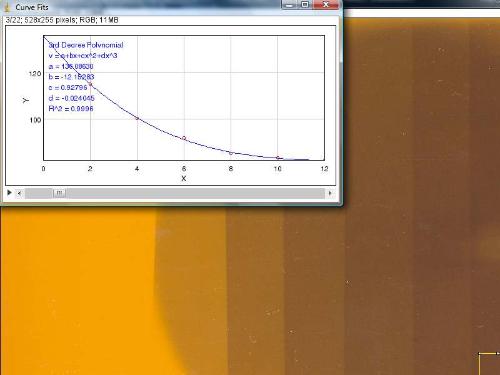Getting the equation out of a fitted curve in ImageJ
Getting the equation out of a fitted curve in ImageJ
|
I am analysing gafchromic filters in a freeware called ImageJ, which uses a simplified form of Java to write macros.
I have a set of datapoints I have successfully connected with different methods and have decided that a third degree polynomial fits the data best, however I need to work with the actual curve, so I need to somehow extract the equation/formula of said polynomial. This should be possible as the variables defining the polynomial are listed on the generated graph, however I can't seem to find a way to extract them in the code. Here's what i get:  And here's my code so far: n = nResults(); x = newArray(n); for (i=0; i<x.length; i++) { x[i] = getResult("Grays ", i); } y = newArray(n); for (i=0; i<y.length; i++) { y[i] = getResult("Mean ", i); } // Do all possible fits, plot them and add the plots to a stack setBatchMode(true); for (i = 0; i < Fit.nEquations; i++) { Fit.doFit(i, x, y); Fit.plot(); if (i == 0) stack = getImageID; else { run("Copy"); close(); selectImage(stack); run("Add Slice"); run("Paste"); } Fit.getEquation(i, name, formula); print(""); print(name+ " ["+formula+"]"); print(" R^2="+d2s(Fit.rSquared,3)); for (j=0; j<Fit.nParams; j++) print(" p["+j+"]="+d2s(Fit.p(j),6)); } setBatchMode(false); run("Select None"); rename("Curve Fits"); } |
Re: Getting the equation out of a fitted curve in ImageJ
|
Hi Marek,
I'm a bit confused. I think you have already solved your problem. You are using 'Fit.p(j)' to access a,b,... If I use your script, my Log windows shows 3rd Degree Polynomial [y = a+bx+cx^2+dx^3] R^2=0.995 p[0]=-1.283063 p[1]=0.939838 p[2]=0.033200 p[3]=-0.000998 If you only use n = nResults(); x = newArray(n); for (i=0; i<x.length; i++) { x[i] = getResult("Grays ", i); } y = newArray(n); for (i=0; i<y.length; i++) { y[i] = getResult("Mean ", i); } Fit.doFit(2, x, y); // 2 is 3rd Degree Polynomial a = Fit.p(0); b = Fit.p(1); c = Fit.p(2); d = Fit.p(3); there is everything you want. With 'Fit.f(x) ' you can even use the fitted equation for calculations. If you want ImageJ to choose the best fit automatically (highest R^2), then the code will be a bit more complex. Best regards Michael Entrup Am 21.02.2014 12:56, schrieb Marek Szeles: > I am analysing gafchromic filters in a freeware called ImageJ, which uses a > simplified form of Java to write macros. > > I have a set of datapoints I have successfully connected with different > methods and have decided that a third degree polynomial fits the data best, > however I need to work with the actual curve, so I need to somehow extract > the equation/formula of said polynomial. This should be possible as the > variables defining the polynomial are listed on the generated graph, however > I can't seem to find a way to extract them in the code. > > Here's what i get: > <http://imagej.1557.x6.nabble.com/file/n5006617/curve_fit.jpg> > > And here's my code so far: > > n = nResults(); > x = newArray(n); > for (i=0; i<x.length; i++) > { > x[i] = getResult("Grays ", i); > } > > y = newArray(n); > for (i=0; i<y.length; i++) > { > y[i] = getResult("Mean ", i); > > } > > > // Do all possible fits, plot them and add the plots to a stack > setBatchMode(true); > for (i = 0; i < Fit.nEquations; i++) { > Fit.doFit(i, x, y); > Fit.plot(); > if (i == 0) > stack = getImageID; > else { > run("Copy"); > close(); > selectImage(stack); > run("Add Slice"); > run("Paste"); > } > Fit.getEquation(i, name, formula); > print(""); print(name+ " ["+formula+"]"); > print(" R^2="+d2s(Fit.rSquared,3)); > for (j=0; j<Fit.nParams; j++) > print(" p["+j+"]="+d2s(Fit.p(j),6)); > } > setBatchMode(false); > run("Select None"); > rename("Curve Fits"); > } > > > > -- > View this message in context: http://imagej.1557.x6.nabble.com/Getting-the-equation-out-of-a-fitted-curve-in-ImageJ-tp5006617.html > Sent from the ImageJ mailing list archive at Nabble.com. > > -- > ImageJ mailing list: http://imagej.nih.gov/ij/list.html > -- ImageJ mailing list: http://imagej.nih.gov/ij/list.html |
Re: Getting the equation out of a fitted curve in ImageJ
|
Hello Michael,
I hope you'll excuse my impoliteness in the original post, as I was fully incapacitated by the problem. I would like to thank you most dearly for solving my problem, which was, as you correctly hinted, caused by my misunderstanding of the functions. Hopefully I'll be wiser the next time round. Once again thank you for your quick and insightful reply, Best Regards, Marek Szeles |
«
Return to ImageJ
|
1 view|%1 views
| Free forum by Nabble | Edit this page |

